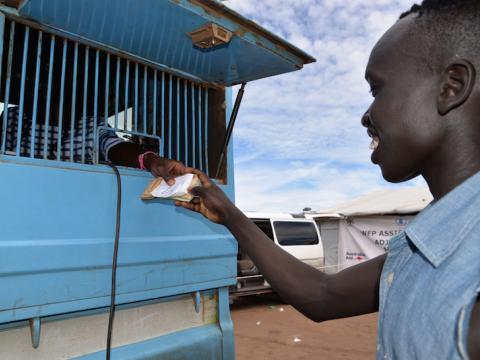A refugee family makes both ends meet, thanks to cash assistance

Late last year, 18yo Emmanuel Atari and his younger brother Frank Okimo, 16, mulled over a decision to move from monthly food rations and register for the cash assistance program. The children are seeking means of having more options over what to eat as their six-year old sister Emma Bidala was having enough of the beans and maize meal served every month.
After intense fighting in South Sudan, the three fled and became refugees in Uganda. As they escaped, they got separated from their parents, found their way in a refugee settlement in West Nile region in northern Uganda and struggled to start a new life. ‘Bidala was increasingly asking us for rice, meat and vegetables which we could not afford. She was getting tired of what we gave her”, shares Emmanuel. After attending a meeting on cash assistance, Emmanuel and Frank, the two brothers made up their minds to switch from dry food rations to cash.
‘’We would still be getting the same cash equivalent of the monthly food rations. With cash, we would have the choice to decide what to eat’’, he adds. After seven months, both brothers affirm they made the right decision. ‘’Our sister is happier. She is able to eat meat and rice at least twice a month. We also set up a small vegetable garden around our house. The assistance is not that sufficient but if you plan for it carefully, you can make both ends meet’’, Emmanuel says.
He has also been able to enrol for secondary education using part of the family’s monthly cash ration. ‘’I attend a secondary school within the host community and all students are required to contribute at least UGX50, 000 (USD$18) for tuition and scholastic materials. Am able to pay this amount in two instalments. In each cycle we get UGX140, 000 (USD$39) and when it comes we get together as a family and plan for it”, he further adds.
Emmanuel and his two brothers are among the over 65,000 refugees in the region currently registered for World Vision’s cash assistance program. Majority of the beneficiaries have used part of their rations to establish small businesses while others have ventured into backyard gardening. In partnership with the World Food Programme (WFP), World Vision and Post Bank facilitate distribution of cash assistance to refugees in Adjumani district, at the Koboko and Rhino settlements in Arua district.
‘’Refugees have a right to choose between cash or food. They pick what best suits them. During the meeting with families, we give them the advantages of both cash and food. We also encourage families to plan together how to spend their money’’, says Ekra Komenan, World Vision’s Food Assistance Manager. Komenan added that refugees registered for the cash assistance program get the same value of what they would get if they were to receive dry food rations.
The amount of cash assistance is being reviewed periodically looking at the current market prices to ensure that it is able to address the basic needs of the recipients.
A WFP primer states that it is ‘’increasingly providing food assistance to refugees through cash transfers so they can buy the food they prefer in the local markets. Cash allows refugees to buy fresh foods and other items to diversify their diets. This also stimulates the local economy by increasing demand for locally produced food. WFP currently assists 65,000 refugees in Uganda with cash and plans to expand cash-based assistance to 140,000 people by the end of 2017”.
It further adds that a WFP survey conducted October 2016 found out “that the assistance given to the refugees produces an ‘income multiplier’ for host communities. When WFP provided cash assistance, each dollar increased real income in and around the settlements by an additional US$1 and US$1.50. And when food was provided to refugees in kind, the corresponding increase was US$1.30.”


